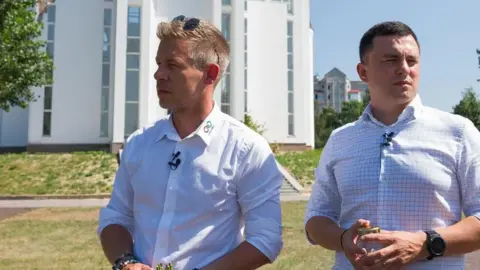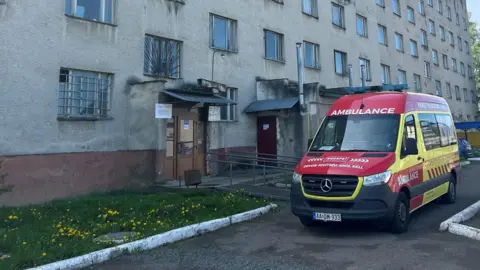Here’s where things stand on Wednesday, May 28:
Fighting
- Russian air defences destroyed or intercepted 112 Ukrainian drones over a three-hour period, most of them over central or southern regions of the country, the Russian Ministry of Defence said in a post on Telegram early on Wednesday, as the two countries continue to trade drone attacks.
- Moscow Mayor Sergei Sobyanin said six Ukrainian drones were repelled while heading for the Russian capital. Recovery crews were examining fragments on the ground, he said.
- Russia deployed 60 drones across multiple regions of Ukraine through the night, injuring 10 people, Ukrainian Air Force officials said.
- More than 850 residents were left without power in the Ukrainian city of Kramatorsk, after three Russian air strikes hit the city late on Monday night.
- Russia’s military said in a post on Telegram that it had begun naval drills in the Baltic Sea with more than 20 warships, boats and support vessels, 25 aircraft and helicopters, and 3,000 servicemen.
Politics
- United States President Donald Trump suggested that he has protected Russia from “really bad things”. In a post on TruthSocial, he said: “What Vladimir Putin doesn’t realise is that if it weren’t for me, lots of really bad things would have already happened to Russia, and I mean REALLY BAD.”
- Responding to Trump’s remarks, Russian security official Dmitry Medvedev said in a post on X: “I only know of one REALLY BAD thing — WWIII. I hope Trump understands this!”
- Trump’s comments came after the the Kremlin said the US president may be experiencing “emotional overload” after Trump’s earlier remarks that Putin was “absolutely crazy” over the scale of Russian air attacks on Ukraine’s cities.
- Keith Kellogg, the US special envoy for Ukraine, told Al Jazeera that the US is waiting for a response from Russia after Trump gave Putin “some guidelines a week ago”.
- Russian Minister of Foreign Affairs Sergey Lavrov accused German Chancellor Friedrich Merz of “pretentiousness” after Merz said that France, Germany, the United Kingdom and the US had lifted range restrictions on weapons supplied to Ukraine.
Energy
- The New York Times reported that satellite images suggest Russia is building new electricity lines in occupied southeastern Ukraine, connecting the grid to the Zaporizhzhia nuclear plant captured by Russia.
- Ukraine’s energy regulator said in a post on Facebook that a gas import mechanism will avoid high transit fees when supplying gas through the Trans-Balkan pipeline from Greece to Ukraine.
- Ukraine’s Minister of Energy German Galushchenko said he hoped all participating countries would agree that the Trans-Balkan Route from Greece to Ukraine would meet “common strategic goals”, as Ukraine continues to explore gas supply routes not involving Russia.
War of words: Russia’s Medvedev rebukes Trump over Putin social media post
A senior Moscow security official has rebuked United States President Donald Trump and raised the danger of another world war breaking out after Trump said Russian leader Vladimir Putin was “playing with fire” by refusing to engage in Ukraine ceasefire talks with Kyiv.
Dmitry Medvedev said World War III was the only “REALLY BAD thing” in a response, late on Tuesday, to Trump, who had earlier posted a message to Putin on social media saying that “really bad things would have already happened in Russia” without his intervention.
“What Vladimir Putin doesn’t realise is that if it weren’t for me, lots of really bad things would have already happened in Russia, and I mean REALLY BAD. He’s playing with fire,” Trump said in a post on his platform Truth Social.
Medvedev responded on the platform X: “Regarding Trump’s words about Putin ‘playing with fire’ and ‘really bad things’ happening to Russia. I only know of one REALLY BAD thing — WWIII.”
“I hope Trump understands this!”
Currently the deputy chairman of Russia’s Security Council and a key Putin ally, Medvedev served as the Russian president between 2008 and 2012, and is known for his sabre-rattling comments.
He has repeatedly warned throughout the course of Russia’s war on Ukraine that Moscow could use its nuclear arsenal.
Putin also raised the possibility of nuclear confrontation in a state of the nation address in March 2024, warning Western powers of Russia’s nuclear capabilities should any decide to deploy troops in support of Ukraine.
“Everything that the West comes up with creates the real threat of a conflict with the use of nuclear weapons, and thus the destruction of civilisation,” Putin said at the time.
Medvedev’s public rebuke of Trump also comes after the US president said in a post on Sunday that Putin had “gone absolutely CRAZY” by carrying out extensive aerial attacks on Ukraine despite widespread calls for a ceasefire and Washington’s frustrated attempts to broker a peace accord.
“I’ve always had a very good relationship with Vladimir Putin of Russia, but something has happened to him,” Trump posted on Sunday.
Trump also told reporters he was considering new sanctions on Russia amid the impasse in ceasefire talks.
Russian forces capturing four villages in Ukraine’s northeastern Sumy region
The war of words on social media comes as hopes for a swift end to Russia’s war on its neighbour dim. Kyiv suffered another battlefield setback on Tuesday, with Russian forces capturing four villages in Ukraine’s northeastern Sumy region.
Sumy Governor Oleh Hryhorov wrote on Facebook that the villages of Novenke, Basivka, Veselivka and Zhuravka had been occupied by Russia, although residents had long been evacuated.
Russia’s Ministry of Defence said on Monday that it had also taken the nearby village of Bilovody, implying a further advance into Ukrainian territory, as the more than three-year war grinds on.
Ukrainian officials have said for weeks that Russian troops are trying to make inroads into the Sumy region, the main city of which lies less than 30km (19 miles) from the border with Russia.
Attacking in small groups on motorcycles
Russian forces, attacking in small groups on motorcycles and supported by aerial drones, have been widening the area where they have been carrying out assaults on the front line, a spokesperson for Ukraine’s border guard service said.
Ukrainian forces last year used the Sumy region as a launchpad to push into Russia’s neighbouring Kursk region, where they captured a vast area of territory before being driven out by Russian forces last month.
Orban accused of using Ukraine spy row in fight for political survival
A spate of arrests, diplomatic expulsions and public humiliations has plunged relations between war-torn Ukraine and its prickly Nato neighbour Hungary to a new low.
At the heart of the row are accusations that Viktor Orban’s Fidesz government in Hungary is using the spat to fight his main political rival, the opposition Tisza party, which leads in the polls ahead of 2026 elections.
Earlier this month, Ukraine’s SBU security service announced the arrest of two Ukrainian citizens accused of spying for Hungary.
According to the allegations, backed by video and audio evidence, the man and woman were in the pay of Hungarian military intelligence, preparing for Hungarian military action in Ukraine.
Hungary then expelled two Ukrainian diplomats and Ukraine followed suit in a tit-for-tat response that has further damaged already sour relations. Hungary also arrested a Ukrainian citizen and accused him of spying.
A Russian ally in Europe
Orban is widely seen as Russia’s closest ally in the European Union, and his government has broken ranks with his European partners by maintaining trade and opposing sanctions on Russia, refusing to allow the transit of weapons, and comparing Ukraine to Afghanistan.
Now he has accused Kyiv of trying to “vilify” his country.
All eight million Hungarian households recently received a questionnaire from the government, dubbed “Vox 2025”, inviting them to reject Ukraine’s EU membership.
Under a year ago, Orban presented himself as the only person on the planet other than the Pope, who was trying to secure an unconditional ceasefire.
But his critics depicted his so-called peace mission to Kyiv, Moscow and other capitals as an attempt to reward Russian aggression.
The day after Orban met Russia’s Vladimir Putin, Russian missiles struck the Ohmatdyt children’s hospital in Kyiv.
Three days later, the leader of the Tisza Party in Hungary, Peter Magyar, brought $40,000 of Hungarian medical aid to the hospital. Opinion polls suggest Magyar could oust Orban from power next April.
The man who drove the Tisza leader to Kyiv, Roland Tseber, is now a target of Fidesz attempts to accuse the Hungarian opposition party of betraying Hungary.

Roland Tseber came across as a fresh-faced, hard-working politician when I met him at a Ukrainian refugee centre in Uzhorod in April.
He was helping distribute medical aid from Hungary, working with Hungarian doctors and psychologists who have supported internally displaced Ukrainians from the eastern war zone, since 2022.
His troubles began within weeks of Peter Magyar’s visit, he told me.
In August, he heard he was banned from Hungary and, at Hungary’s insistence, from the whole Schengen zone of the EU, without explanation.
Mr Tseber’s letter to the Hungarian embassy in Kyiv went unanswered.
The leader of the far-right Our Homeland party in the Hungarian Parliament, Laszlo Toroczkai, labelled him a “terrorist”. Mate Kocsis the leader of the Fidesz faction in the Hungarian parliament, has called him a “Ukrainian spy”, long in the sights of Hungarian counter-intelligence.
“I reject all such accusations which try to link me to intelligence activities of any kind. This is ridiculous. I’m a Transcarpathian politician who works honestly and openly for his homeland and for Hungarian interests,” Mr Tseber told me in a phone interview.

As an elected, independent councillor in the regional assembly of Transcarpathia, who sits in the political group of Ukrainian President Volodymyr Zelensky’s Servant of the People party, he meets politicians of all shades, he says, including the deputy Hungarian Foreign Minister, Levente Magyar.
“I’m a Ukrainian politician and I meet with everyone. This whole situation is ridiculous. They want to drag me into this spy story. But anyone with any common sense can understand that this is absurd.”
The weakest link in the Hungarian government’s narrative is that if he was really on the radar of Hungarian intelligence, government politicians and Peter Magyar as a Member of the European Parliament would have been warned to stay away from him.
The dwindling Hungarian community in Transcarpathia has become collateral damage in the Ukraine-Hungary row.
In Ukraine’s last census, in 2001, their population was 150,000, but latest estimates suggest their number has since halved to 70-80,000. Dozens have lost their lives, fighting for Ukraine against Russia.
Another twist in the story is that a former Hungarian chief-of-staff, Romulusz Ruszin-Szendi, who’s now a prominent Tisza party politician, has come under attack from government-controlled media.
The government alleges that “a former senior figure in the defence sector” – an apparent reference to Ruszin-Szendi – was in contact with Ukrainian intelligence.
Ruszin-Szendi hit back, alleging a smear campaign. “I am a decent Hungarian citizen who has worn the uniform since the age of 14. I am shocked and saddened to know that what I and my comrades have done for our country is worth so much for you,” he addressed the government on Facebook.
Since the full-scale Russian invasion of Ukraine in February 2022, Viktor Orban has portrayed himself as a man of peace, and won the April 2022 election with a promise to keep Hungary out of the war in Ukraine.
However, a speech from 2023 that has only just been leaked by Peter Magyar tells a very different story.
Defence Minister Kristof Szalay-Bobrovniczky was recorded saying a year after the war in Ukraine began that the government had decided to break with the peace mentality and move to “phase zero of the road to war”, with a combat-read Hungarian army.
This was the same year that many experienced Atlanticists such as Ruszin-Szendi were sacked as part of a “rejuvenation” of the military.
They were replaced by officers loyal to the government’s pro-Moscow stance.